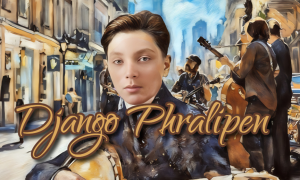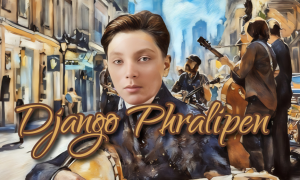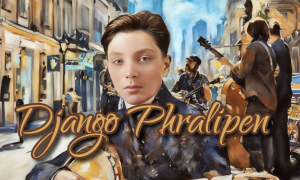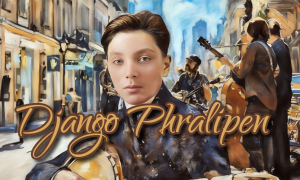Home » Jazz Articles » Django's Cosmic Echo » Chapter Seven: The Night London Heard
Chapter Seven: The Night London Heard
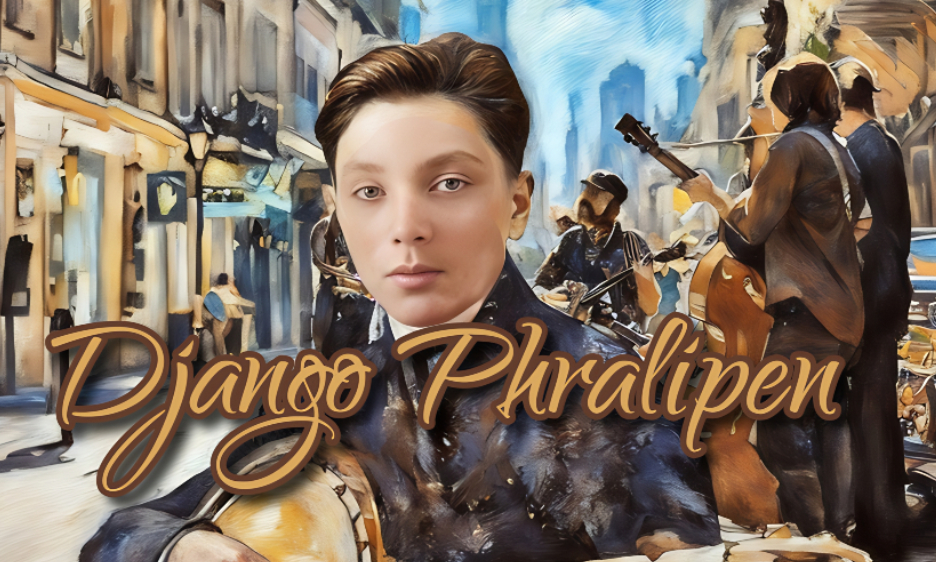
Courtesy AI
Chapters
1 | 2 | 3 | 4 | 5 | 6 | 7 | 8 | 9 | 10 | 11 | 12 | 13 | 14 | 15 | 16 | 17 | 18The afternoon soundcheck at Ronnie Scott's legendary jazz club in Soho was, by all accounts, explosive. Django, testing the room's acoustics and the house equipment, had let fly a few signature runs that left the jaded sound engineer and a handful of early-arriving staff blinking in disbelief. By the time the doors opened for the normally subdued Tuesday night crowd, word had inexplicably, almost telepathically, rippled through the tight-knit London music scene. Tourists expecting a quiet evening of cool jazz found themselves amidst a veritable who's who of British rock royalty. Faces from the covers of Melody Maker and NME—guitarists known for their own pyrotechnics, singers whose voices defined a generation—were crammed into booths or leaning against the iconic red-velvet walls, all drawn by the whispers of an unknown Dutch band fronted by a supposed teenage guitar prodigy.
Backstage, or rather, in the cramped, memorabilia-lined space that served as one, Dirk gathered the Brotherhood. Django, feeling the need for air and space, had slipped out for a walk around the block to clear his head. "Alright lads," Dirk said, his voice calm despite the thrum of anticipation he felt. "Look out there. See those faces? Most of them are probably here to see what all the fuss is about Django. That means the pressure, if there is any, is on him. And believe me," he met each of their eyes, "he can handle it. More than handle it. Your job is to be yourselves, play like you always do. This is just another gig. A very well-attended gig, perhaps, but a gig nonetheless. Be solid, be true, and let him fly." Dave, Leo, and Stefan nodded, a mixture of nerves and excitement in their eyes. They knew Dirk was right.
Meanwhile, Ronnie Scott himself, a connoisseur of both music and celebrity, was working the room, greeting familiar faces, his expression a mixture of hostly charm and private curiosity about the act his old friend Dirk had so passionately vouched for. As the minutes ticked closer to showtime, a quarter-hour before they were due on, Dirk glanced anxiously towards the club entrance. No Django. He feigned composure, exchanging a knowing look with Ronnie, but inside, a cold knot of panic was tightening. This wasn't like Django.
The house lights dimmed further. A hush fell over the packed club. Ronnie Scott stepped to the microphone. "Ladies and gentlemen," his voice rasped, "tonight, a little something special for you, all the way from Amsterdam... " Dirk's heart hammered. Still no sign. Then, just as Ronnie was about to continue, the club door opened. A slim figure slipped past the ma?tre d,' weaved through the tables with an unhurried grace, and hopped onto the low stage. It was Django, looking every bit the teenager he was, his dark hair slightly tousled from his walk. He casually slung his Gibson over his shoulder. With his index and middle finger, he gave Ronnie Scott, standing near the bar, a brief, friendly salute—cool as a cucumber. Dirk let out a breath he hadn't realized he'd been holding and nudged the still mouth-gaping Brotherhood onto the stage behind their leader.
Django plugged in. A low hum from the amp. He surveyed the room, a faint, almost imperceptible smile playing on his lips. "Thanks for turning out," he said, his voice amplified but still soft, carrying a hint of an accent that only added to the mystique. "We're going to start with my take on an old standard, 'Swing 42.' Let's call this one... 'Swing 68.' Oh," he added, as if an afterthought, "I'm Django Phralipen. And these fine gentlemen are the Brotherhood."
He counted them in, and then it began. If the original Django Reinhardt had been a wizard with two burn-scarred fingers, this young Django, with an intact left hand and the quiet, unshakable confidence born of knowing what he'd already achieved in a past life, was something more. It wasn't just technical brilliance, though that was present in spades, each note perfectly articulated, each run a cascade of liquid fire. It was the feel, the soul. An otherworldly aura of confidence and natural grace emanated from him. Dirk, who had witnessed Django's genius countless times, found himself stunned. This was a new dimension, a deeper well of artistry than even he had suspected. The boy on stage was channeling not just his own past, but the very spirit of music itself, infusing it with the raw energy and amplified power of this new era.
The reinvented "Swing 68" was a revelation—the familiar melody soared, twisted, and dived through bluesy bends, rock-inflected power chords, and dizzying improvisational flights, all while the Brotherhood laid down a groove that was both deeply swinging and undeniably modern. From there, the setlist became a journey. Django, who had an uncanny ear for melody, had picked up on the psychedelic folk gifts of Donovan. He took "Wear Your Love Like Heaven," "Sunshine Superman," and "There Is a Mountain" and transformed them into extended sonic portraits, the original tunes serving as launch pads for breathtaking instrumental explorations where Stefan's mandolin danced with Django's guitar, and Leo's bass wove intricate counterpoints. He then seamlessly segued

Toots Thielemans
harmonica1922 - 2016

The Beatles
band / ensemble / orchestraFrom his discreet booth, Geoff Litchman watched, a storm of conflicting emotions brewing within him. What he was witnessing utterly dwarfed the already impressive display he'd seen in Amsterdam. The sheer audacity, the effortless virtuosity, the emotional depth—it was staggering. He felt a surge of pride in his A&R instincts; he'd spotted this. But simultaneously, a growing unease settled in. Litchman was no longer sure he had Django in the bag; after a performance like this, in front of this crowd, word would spread like wildfire. This new phenom was about to become a very hot, and very contested, commodity. The power dynamic he'd assumed was his had decisively, irrevocably shifted.
As the final, ringing chord of their set faded, a split second of stunned silence hung in the air before Ronnie Scott's erupted. It wasn't just applause; it was a roar, a tidal wave of appreciation from a room full of people who knew they had just witnessed something truly special. Across the crowded club, Ronnie Scott caught Dirk's eye. A wide, genuine smile spread across the club owner's face. He slowly raised his hand and gave Dirk the same two-fingered salute Django had offered him earlier. The gambit had paid off, and then some. London had heard. And it would never forget the night The Django Phralipen Brotherhood, led by a teenage phantom from another time, had conquered Ronnie Scott's.
Story by Alan Bryson, edited and assisted by AI.
Disclaimer: This is a fictional account exploring what might have happened if a temporal quantum event had occurred. While real musicians and historical figures appear within these pages, they exist here in an alternate timeline—a reality that quantum theory suggests was possible, but that never came to pass. All interactions, conversations, and events involving these individuals are entirely fictional, products of a world that exists only in the space between what was and what might have been.
Tags
Comments
PREVIOUS / NEXT
Support All About Jazz
 All About Jazz has been a pillar of jazz since 1995, championing it as an art form and, more importantly, supporting the musicians who make it. Our enduring commitment has made "AAJ" one of the most culturally important websites of its kind, read by hundreds of thousands of fans, musicians and industry figures every month.
All About Jazz has been a pillar of jazz since 1995, championing it as an art form and, more importantly, supporting the musicians who make it. Our enduring commitment has made "AAJ" one of the most culturally important websites of its kind, read by hundreds of thousands of fans, musicians and industry figures every month.




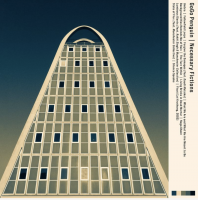

 Buy Now
Buy Now






